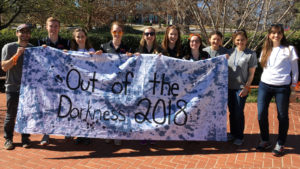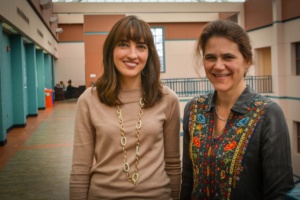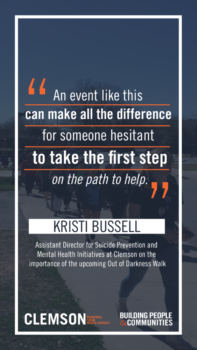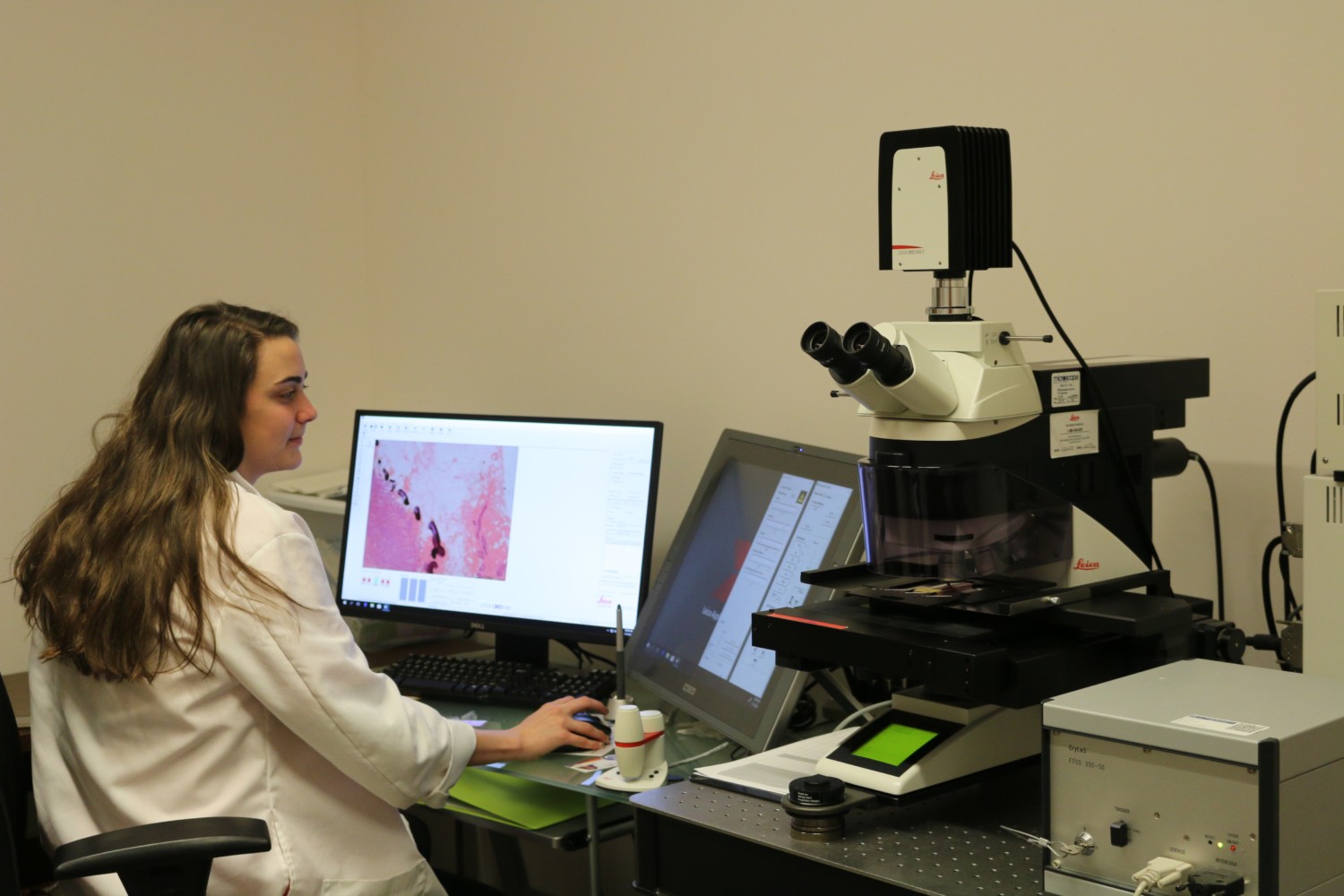Clemson’s Out of Darkness Campus Walk aimed at suicide awareness and prevention

The Clemson Creative Inquiry Team at last year’s Out of Darkness Walk included Daniel Solomon, Dylan Erikson, Becca Roth, Molly Fields, Kristin Free, Chastyn Webster, Brie Krug, Kristi Bussell, Martie Thompson and Heidi Zinzow (left to right).
CLEMSON — Clemson faculty and students will gather for the university’s fourth annual Out of Darkness Campus Walk, an event that serves as a fundraiser and an opportunity for the community to raise awareness of mental health issues related to suicide. Registration for the walk starts at 11 a.m. March 2 in front of Tillman Hall, where the walk is set to begin at noon. The event is free and open to the public.
Out of Darkness Campus Walks are so named by the American Foundation of Suicide Prevention (AFSP) because of their ability to bring a taboo topic such as suicide “out in the open” so it can be discussed. According to Kristi Bussell, assistant director for suicide prevention and mental health initiatives for Clemson University Student Health Services, the walk can connect students and people in the Clemson community with resources for themselves or loved ones, but it mainly serves to provide those same audiences with hope.
“An event like this can make all the difference for someone hesitant to take the first step on the path to help,” Bussell says. “We can have a great deal of data and information on issues around suicide, but it won’t help at all if no one is talking about it.”
Bussell helps to oversee the work of a creative inquiry team working with Tigers Together, Clemson’s suicide prevention initiative. The team is made up of undergraduate students who work to reduce stigma, decrease risk factors, enhance protective factors and train staff and students to be advocates.
According to Bussell, approximately 200 people attended last year’s walk, which raised over $7,000 through online donations and those made at the event. Organizers donate any money raised to the South Carolina chapter of the AFSP and the AFSP at large, which in turn funds research on effective suicide prevention methods.
Shedding light on suicide prevention
Clemson researchers conduct their fair share of that research in the area of suicide prevention, and several faculty members’ work in the area is directly involved with Tigers Together. The program’s suicide prevention advocacy program is largely informed by the research conducted by Clemson faculty members Heidi Zinzow and Martie Thompson. Their work, funded by the Substance Abuse and Mental Health Services Administration, has shown that events like the walk can be a strong complement to advocacy training.

Drs. Heidi Zinzow (left) and Martie Thompson have several ongoing research projects to better understand suicide.
“Training gives people the ability to recognize risk behavior and approach the person about it, but an event like this is powerful in a different way,” Zinzow says. “Just coming into contact with a stigmatized population can help the people in attendance feel more comfortable dealing with a sensitive issue.”
Thanks to funding from the AFSP, Thompson recently examined data from the National Longitudinal Study of Adolescent Health to assess different trajectories of suicidal behavior. The research focused on youth transitioning into young adulthood and how suicide likelihood changes in relation to changes in risk factors such as alcohol problems, delinquency and impulsivity.
In a national sample of over 9,000 adolescents followed into young adulthood, Thompson found that approximately 1 in 20 adolescents had an elevated likelihood of attempting suicide, but this likelihood decreased as they aged. Less than two percent had an elevated likelihood of attempting suicide across both adolescence and young adulthood. Thompson found also that, in general, a decrease over time in risk factors lead to a decreased risk of suicide as youth entered young adulthood. This suggests that interventions designed to influence risk factors can help prevent suicide.
Zinzow and Thompson’s most recent research collaboration on the topic examined the effectiveness of Clemson’s suicide prevention advocacy training, which includes role play exercises that teach participants how to talk to at-risk students about suicide and refer them for resources. They examined the behavior of people before and after training, and found an increase in instances of trainees broaching the topic of suicide and connecting students with resources.
Moving toward understanding and healing
Bussell says any activity that helps college-age students develop and sustain relationships serves as a boost to suicide prevention efforts. She sites data from a National College Health Association survey, which reports that 17.9 percent of people who reported not having close, healthy relationships thought about suicide in the last year compared to the 5.8 percent who reported enjoying close, healthy relationships.
Bussell says an event like the walk serves as a hub of resources for those who work as advocates, those who struggle with suicide ideation or those who have lost a loved one to suicide. She sees the event as a manifestation of the work that Tigers Together does all year long, a statement of hope for faculty, staff, students and community members.
“During our advocacy training, we give out stickers that people can put on their door or laptop that help identify them as someone people can talk to about suicide,” Bussell says. “This event does that in a big way because it’s a coming together of all of those people for the sake of the entire Clemson community.”
This year’s event will include recorded video interviews with four speakers that will be shown at the event. The speakers include Clemson staff members Brennan Beck, director for military and veteran engagement; and Erin Siders, an academic advisor and coaching specialist. Attendees will also hear from Tigers Together creative inquiry students Kenedey Ward and Daniel Solomon.


